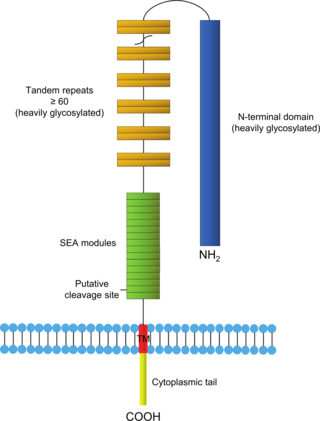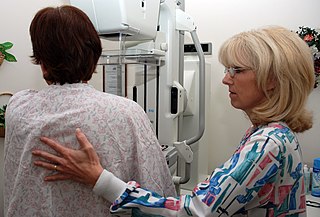Related Research Articles

Georgios Nikolaou Papanikolaou was a Greek physician,zoologist and microscopist who was a pioneer in cytopathology and early cancer detection,and inventor of the "Pap smear".

Uterine cancer,also known as womb cancer,includes two types of cancer that develop from the tissues of the uterus. Endometrial cancer forms from the lining of the uterus,and uterine sarcoma forms from the muscles or support tissue of the uterus. Endometrial cancer accounts for approximately 90% of all uterine cancers in the United States. Symptoms of endometrial cancer include changes in vaginal bleeding or pain in the pelvis. Symptoms of uterine sarcoma include unusual vaginal bleeding or a mass in the vagina.

Mucin-16(MUC-16) also known as Ovarian cancer-related tumor marker CA125 is a protein that in humans is encoded by the MUC16 gene. MUC-16 is a member of the mucin family glycoproteins. MUC-16 has found application as a tumor marker or biomarker that may be elevated in the blood of some patients with specific types of cancers,most notably ovarian cancer,or other conditions that are benign.

Desmoplastic small-round-cell tumor (DSRCT) is an aggressive and rare cancer that primarily occurs as masses in the abdomen. Other areas affected may include the lymph nodes,the lining of the abdomen,diaphragm,spleen,liver,chest wall,skull,spinal cord,large intestine,small intestine,bladder,brain,lungs,testicles,ovaries,and the pelvis. Reported sites of metastatic spread include the liver,lungs,lymph nodes,brain,skull,and bones. It is characterized by the EWS-WT1 fusion protein.
In biomedical contexts,a biomarker,or biological marker,is a measurable indicator of some biological state or condition. Biomarkers are often measured and evaluated using blood,urine,or soft tissues to examine normal biological processes,pathogenic processes,or pharmacologic responses to a therapeutic intervention. Biomarkers are used in many scientific fields.
In medicine,a biomarker is a measurable indicator of the severity or presence of some disease state. It may be defined as a "cellular,biochemical or molecular alteration in cells,tissues or fluids that can be measured and evaluated to indicate normal biological processes,pathogenic processes,or pharmacological responses to a therapeutic intervention." More generally a biomarker is anything that can be used as an indicator of a particular disease state or some other physiological state of an organism. According to the WHO,the indicator may be chemical,physical,or biological in nature - and the measurement may be functional,physiological,biochemical,cellular,or molecular.
Early prostate cancer antigen-2 (EPCA-2) is a protein of which blood levels are elevated in prostate cancer. It appears to provide more accuracy in identifying early prostate cancer than the standard prostate cancer marker,PSA.

Transketolase-like-1 (TKTL1) is a gene closely related to the transketolase gene (TKT). It emerged in mammals during the course of evolution and,according to the latest research findings,is considered one of the key genes that distinguishes modern humans from Neanderthals.

The objective of cancer screening is to detect cancer before symptoms appear,involving various methods such as blood tests,urine tests,DNA tests,and medical imaging. The purpose of screening is early cancer detection,to make the cancer easier to treat and extending life expectancy. In 2019,cancer was the second leading cause of death globally;more recent data is pending due to the COVID-19 pandemic.
Moca,MoCA,or MOCA may refer to:

Saliva testing or Salivaomics is a diagnostic technique that involves laboratory analysis of saliva to identify markers of endocrine,immunologic,inflammatory,infectious,and other types of conditions. Saliva is a useful biological fluid for assaying steroid hormones such as cortisol,genetic material like RNA,proteins such as enzymes and antibodies,and a variety of other substances,including natural metabolites,including saliva nitrite,a biomarker for nitric oxide status. Saliva testing is used to screen for or diagnose numerous conditions and disease states,including Cushing's disease,anovulation,HIV,cancer,parasites,hypogonadism,and allergies. Salivary testing has even been used by the U.S. government to assess circadian rhythm shifts in astronauts before flight and to evaluate hormonal profiles of soldiers undergoing military survival training.

A cancer biomarker refers to a substance or process that is indicative of the presence of cancer in the body. A biomarker may be a molecule secreted by a tumor or a specific response of the body to the presence of cancer. Genetic,epigenetic,proteomic,glycomic,and imaging biomarkers can be used for cancer diagnosis,prognosis,and epidemiology. Ideally,such biomarkers can be assayed in non-invasively collected biofluids like blood or serum.
A liquid biopsy,also known as fluid biopsy or fluid phase biopsy,is the sampling and analysis of non-solid biological tissue,primarily blood. Like traditional biopsy,this type of technique is mainly used as a diagnostic and monitoring tool for diseases such as cancer,with the added benefit of being largely non-invasive. Liquid biopsies may also be used to validate the efficiency of a cancer treatment drug by taking multiple samples in the span of a few weeks. The technology may also prove beneficial for patients after treatment to monitor relapse.
The Minnesota Ovarian Cancer Alliance (MOCA) is an organization for women with ovarian cancer in the state of Minnesota. The organization raises public awareness of ovarian cancer and helps to fund medical research. MOCA was established in 1999.
Sarah-Jane Dawson is an Australian clinician-scientist. She is a consultant medical oncologist and head of the Molecular Biomarkers and Translational Genomics Laboratory at the Peter MacCallum Cancer Centre in Melbourne. Her current research interests are focused on the development of noninvasive blood-based biomarkers for clinical application,including early detection,risk stratification and disease monitoring in cancer management.
Luis Alberto Diaz,Jr. is the Head of the Division of Solid Tumor Oncology in Memorial Sloan Kettering’s Department of Medicine.
Jennifer Kehlet Barton is an American biomedical engineer who is Director of the BIO5 Institute at the University of Arizona. Barton develops optical techniques for the detection and treatment of cancer.

Sarah Blagden is a Professor of Experimental Oncology at the University of Oxford. Her laboratory research is in investigating post-transcriptional mechanisms for ovarian cancer behavior. Her clinical research is in conducting early phase trials in novel cancer therapeutics for people with advanced malignancies.
Beth Young Karlan is an American gynecologic oncologist. In 2008,she was named editor-in-chief of the medical journals Gynecologic Oncology and Gynecologic Oncology Reports. In 2012,Karlan was appointed by the White House to serve on the National Cancer Advisory Board,and in 2015,she was elected to the National Academy of Medicine.
Sofia Diana Merajver is an American-Argentine medical oncologist. She is the GreaterGood Breast Cancer Research Professor and director of the Breast and Ovarian Cancer Risk Evaluation Program at Michigan Medicine. In 2022,Merajver was elected a Fellow of the American Association for the Advancement of Science.
References
- ↑ "NORDEN, CATHERINE". Baltimore Sun. October 18, 2008. Retrieved February 7, 2021.
- 1 2 "Trees of Hope: MOCA and the search for an early detection test". wdio.com. December 1, 2020. Retrieved February 7, 2021.
- 1 2 "Interview – Dr. Amy Skubitz, Fascinated by Science". reininsarcoma.org. Retrieved February 7, 2021.
- ↑ "Amy Skubitz". Medical School. Retrieved 2024-04-09.
- ↑ Collins, Liz (December 1, 2014). "MOCA Fundraising Furthers U Of M Ovarian Cancer Research". minnesota.cbslocal.com. Retrieved February 7, 2021.
- ↑ "Developing a blood test to screen for ovarian cancer". twin-cities.umn.edu. March 20, 2019. Retrieved February 7, 2021.
- ↑ Austin, Jennifer (April 18, 2019). "U of M researcher hopes to develop first early detection test for ovarian cancer". kare11.com. Retrieved February 7, 2021.
- ↑ "Amy Patrice Skubitz, PhD". rivkin.org. Retrieved February 7, 2021.